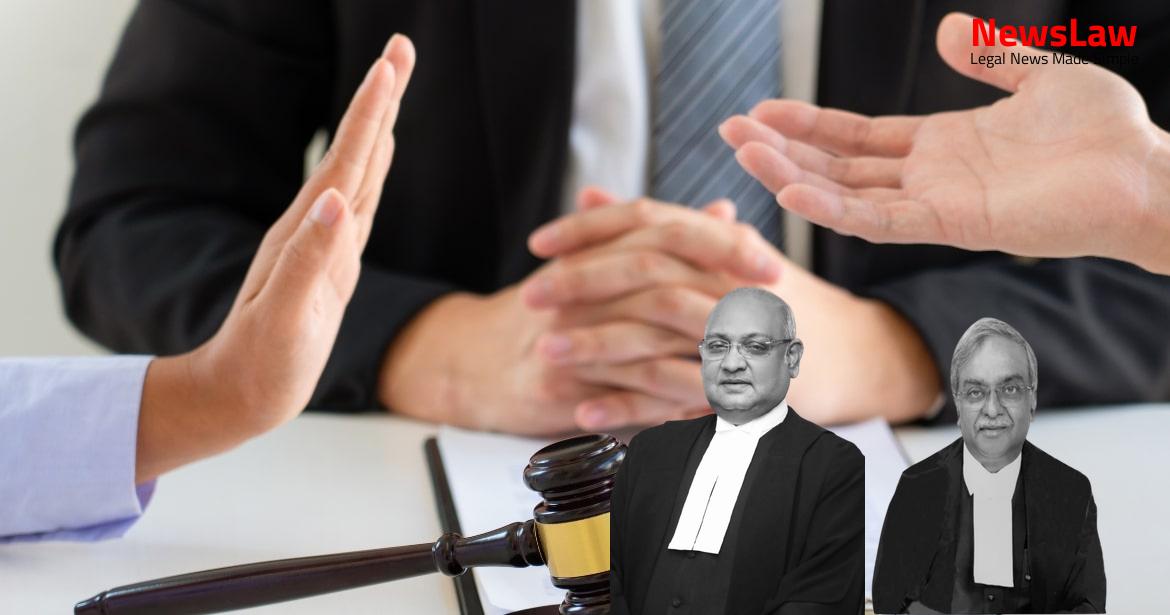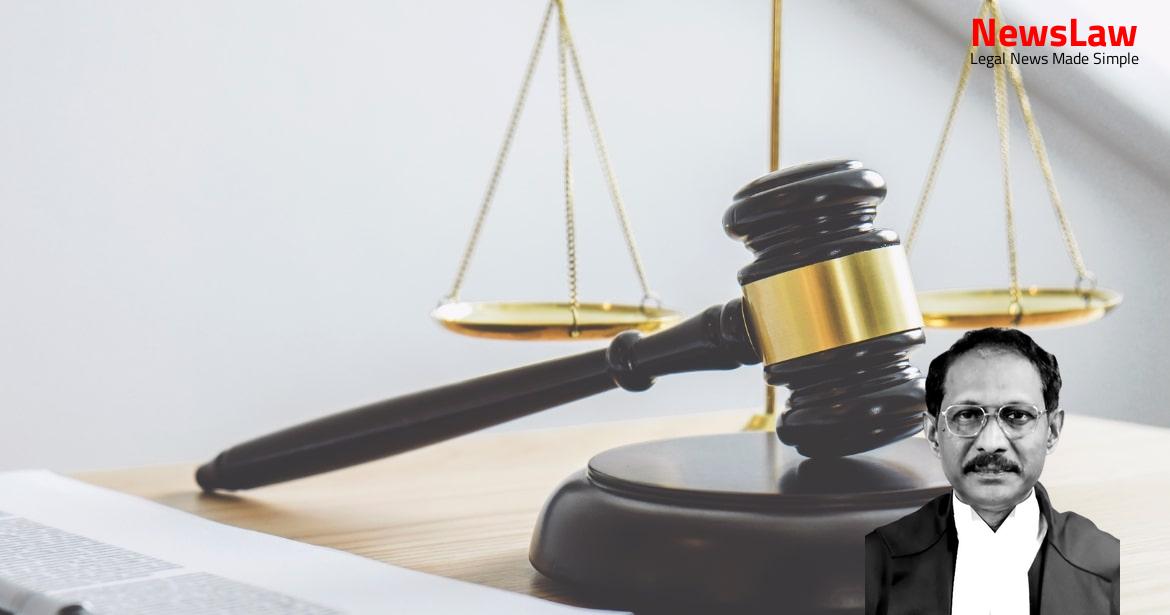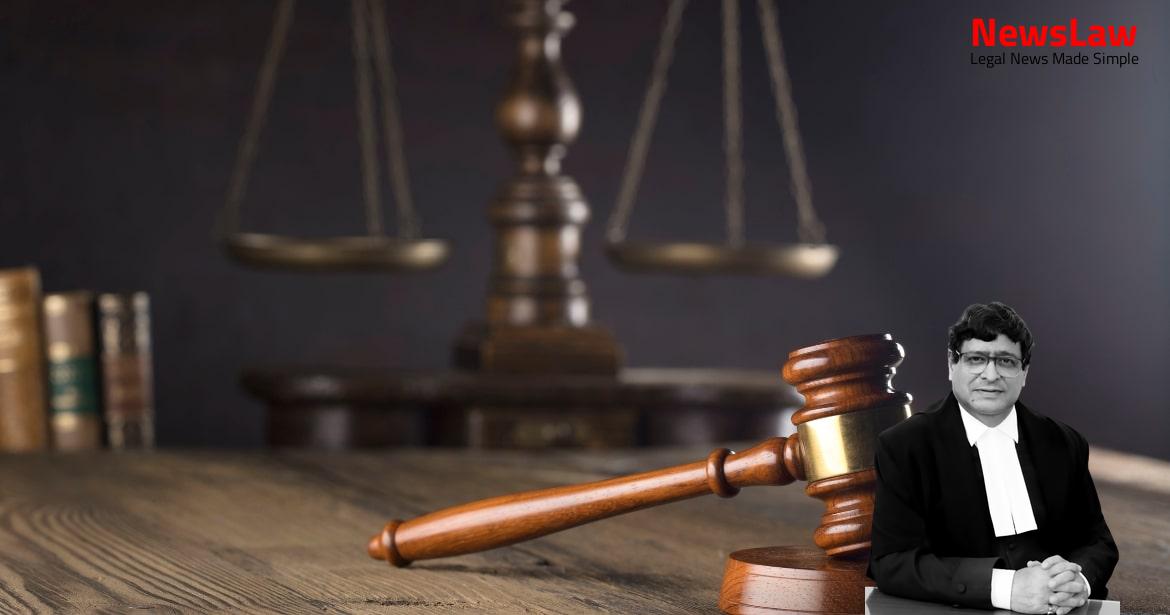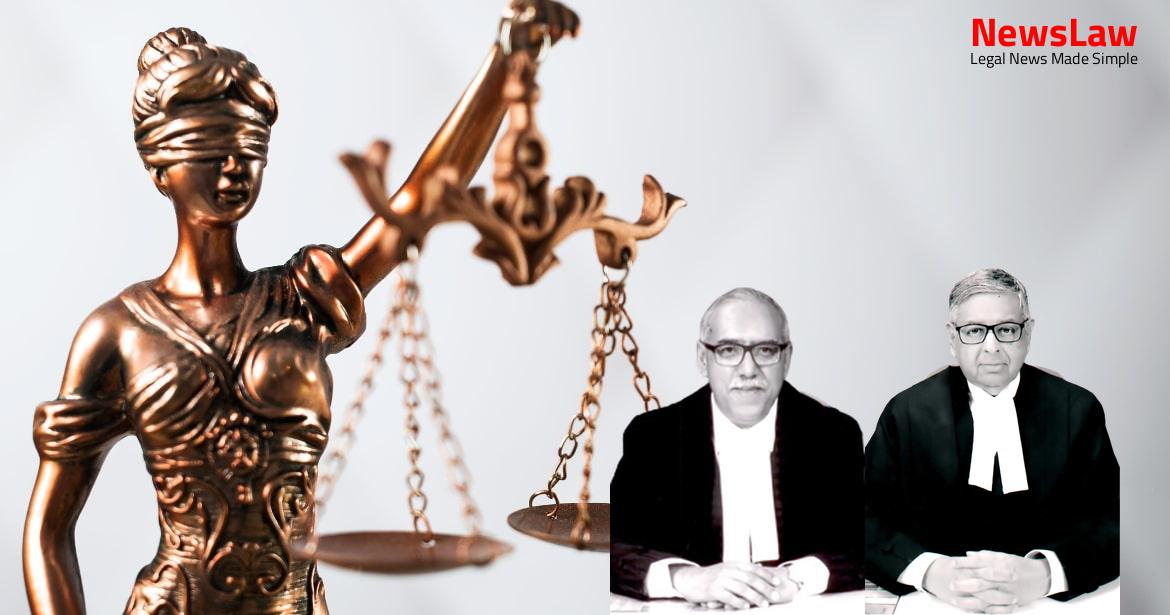Delve into the intricate legal analysis of court fees valuation in a recent case, where the High Court examined the application of ad valorem fees on claimed amounts. The court’s interpretation and application of relevant laws and precedents shed light on the complexities of determining proper valuation in legal proceedings. Stay informed about the legal intricacies shaping court fees assessment in litigation.
Facts
- The appellants filed an application under Order VII Rule 11 (c) read with Section 151 CPC on the ground of non-payment of requisite Court-fees.
- The Trial Court directed the respondent to file the Court-fees on the amount of Rs.20 Lakhs as claimed by him within 10 weeks.
- The respondent had filed two writ petitions before the High Court at Chandigarh regarding the certificate of ‘freedom fighter’.
- The High Court disposed of the writ petitions on specific dates, recognizing the respondent as a freedom fighter.
- The respondent claimed damages of approximately Rs.20 Lakhs due to denial of the freedom fighter status by defendant No.3.
- A suit was instituted by the respondent for the recovery of Rs.20 Lakhs as damages, which was later dismissed by the Trial Court on 28.02.2020.
- The appellants did not carry the judgment further, suggesting abandonment of the issue.
- The respondent filed an appeal under Section 96 of the CPC, which is currently pending.
- The appellants raised preliminary objections regarding the stamping of the suit for Court-fees purposes in their written statement.
- An issue relating to the proper valuation of the suit for Court-fees was framed before the Trial Court.
- The respondent’s background as a renowned member of Jalandhar and a recognized freedom fighter by the Government of Punjab was detailed in the plaint.
- The High Court set aside the Trial Court’s order and rejected the appellant’s application under Order VII Rule 11 CPC.
- The High Court directed the Trial Court to proceed with the suit.
- The respondent undertakes to pay the court fees on the amount adjudicated as damages by the Court in due course of time.
- The valuation of the suit was fixed at more than Rs.20 lakhs, but court fees of Rs.50/- were affixed based on a judgment of the Punjab & Haryana High Court.
- The Trial Court dismissed the suit but placed the burden of proof on the defendants to show deficiency in court fees on the Rs.20 lakhs claimed as compensation.
- The High Court determined that as the actual amount of damages was yet to be assessed by the Trial Court, the direction to pay ad valorem court fees on Rs.20 lakhs was not legally sustainable.
- In a similar case of defamation, the High Court allowed the petitioner to pay court fees on the sum adjudicated as damages by the lower court in due course of time.
Also Read: Legal Analysis on Alleged Multiple Agreements in Property Sale Case
Issue
- The Court was considering whether the plaintiff was liable to pay ad valorem court fees on the amount mentioned in the plaint.
- If the Court found the plaintiff liable, it would be of academic interest only as the appellants had abandoned their plea regarding valuation by not filing any cross objection or appeal.
- Section 6 of Chapter III of the Act states that specified documents cannot be filed in court or received by public officers unless the proper fee indicated in the Schedules is paid.
- The First Schedule outlines ad valorem court fees calculation while the Second Schedule lists fixed court fees for different types of plaints, documents, and pleadings.
Also Read: Ensuring Maintenance Rights: Court’s Legal Analysis
Arguments
- The learned counsel representing the plaintiff-respondent, Shri Abhimanyu Tiwari, supported the High Court’s order as just, valid, and lawful.
- The High Court’s rejection of the application under Order VII Rule 11 was justified based on previous judgments cited in the order.
- The inability to ascertain the proper valuation at the initiation of the suit meant that charging ad valorem court fees on a tentative amount mentioned in the plaint was not warranted.
- The High Court allowed the Trial Court to determine the actual valuation post-trial, at which point court fees would be collected from the plaintiff per the provided undertaking.
- The High Court’s actions were deemed error-free, considering the above points and the references made to supporting judgments like M/s Commercial Aviation & Travel Company vs. Vimla Pannalal.
Also Read: Legal Analysis: High Court’s Critique of Authority Actions
Analysis
- The case of M/s Commercial Aviation (supra) and Chettiar (supra) were misinterpreted by the Punjab & Haryana High Court in several orders
- The judgement in the case of M/s Commercial Aviation (supra) stated that for suits covered by clauses other than Section 7(iv), there should be no separate valuation for court fees and jurisdiction
- The High Court in the impugned judgement referred to several other authorities to support its conclusion
- The High Court also granted liberty for amending the plaint to adjust court fees in a suit for malicious prosecution
- Various judgments of the Punjab and Haryana High Court were relied upon by the High Court in reaching its decision
- The Court pointed out errors in relying on judgments that were not relevant to the case at hand
- It was highlighted that ad valorem court fees would be payable in a suit for malicious prosecution for a claim of Rs. 2 Crores
- The relevance of Section 7(i) of the Act for court fees was emphasized over Section 7(iv)
- The Court also mentioned specific cases like Ranjit Kaur vs PSEB and Manjeet Singh vs Beant Sharma in the discussion
- A paragraph from the Constitution Bench decision in S.RM.AR.RM. Ramanathan Chettiar was quoted to explain legislative intent behind the valuation of claims in suits falling under Section 7(iv) of the Act
- The appellant gave a valuation of Rs. 15 lacs for his share for jurisdiction purposes.
- The relief claimed was for partition and accounts, falling under different categories for court fees payment.
- The scheme of Section 7 allows the plaintiff to value their claim for court fees payment in certain suits.
- The option to value the claim for court fees is provided due to difficulty in valuing claims like partition.
- The suit in question was considered a money suit for compensation/damages under Section 7(i) as per judicial precedents.
- The Trial Court’s findings on issue No.3 were not challenged by the State due to prior pending appeal.
- The plaintiff’s claim for partition asked for separate properties based on undivided share in joint family property.
- Section 7(iv) allows for different valuations for relief sought in certain suits, providing liberty to plaintiffs.
- In cases like suits for accounts, it is challenging to accurately value the relief sought, leading to separate valuations.
- The suits for accounts and dissolution of partnership fall under the specified categories of Section 7(iv) of the Act.
- Defines the computation of fees payable in certain suits.
- Specifies that in suits for money, including damages or compensation, the fee is payable according to the amount claimed.
- Lists six categories of suits for movable property of no market value, including suits for enforcing a right to share in joint family property.
- States that the plaintiff must value the relief sought in all such suits.
- Explains the fees payable on documents filed in Mofussil Courts or public offices, with exceptions for specific types of suits like injunctions, easements, and accounts.
- Clarifies that no document chargeable in the First or Second Schedule of the Act shall be filed in any Court of Justice unless the proper fee is paid.
- Judgment in the case of Ranjit Kaur dealt with case laws from this Court and different High Courts
- Noted that judgments in the case of Subhash Chander Goel, Jagdip Singh Chowhan, and Hemraj did not consider statutory provisions and other binding precedents
- The High Court erred in setting aside the Trial Court’s order granting time to the plaintiff-respondent to pay court fees
- Two judgments cited by the respondent are found to be inapplicable
- The State, as a respondent, can question the finding on issue No.3 during appeal
- Ms. Babbar’s arguments regarding the abuse of the process of law are not addressed and left for the Appellate Court to decide
Decision
- The Appellate Court allows the plaintiff (appellant) to state the valuation and grants reasonable time for payment of court fees before proceeding further in the appeal.
- The appeal is allowed with no order as to costs.
- Pending applications, if any, are disposed of.
- The judgment and order of the High Court dated 11.08.2017 is set aside, and that of the Trial Court dated 10.11.2016 is restored.
- Although the suit was finally dismissed on 28.02.2020, court fees were still payable by the plaintiff-respondent on the valuation of Rs. 20 lakhs.
- The plaintiff-respondent is directed to make payment of the court fees within four weeks from today.
- The plaintiff-respondent is also required to make payment of court fees in the appeal based on the value he places on the relief sought in the appeal.
Case Title: THE STATE OF PUNJAB Vs. DEV BRAT SHARMA (2022 INSC 316)
Case Number: C.A. No.-002064-002064 / 2022



